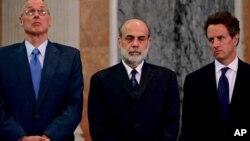More than two years after the U.S. government approved the $700 billion emergency bailout for the financial system, unemployment is high and housing foreclosures are still a cause for concern. Charles Ferguson's documentary "Inside Job," takes a hard look at the causes of the 2008 financial meltdown and warns there could be another recession if the Obama administration is not tougher on the U.S. banking sector and businesses it considers "too big to fail."
In the film, Ferguson argues that greed and risky investments by Wall Street investors, bankers and CEOs drove the country into the 2008 meltdown. Two years later, he still believe justice has not been served. Not a single individual has been indicted for what Ferguson calls, "defrauding America."
"Part of the reason I made the film was to help people understand what happened, to make it possible for average Americans to understand why America is still in this very terrible situation," says Ferguson.
His well-researched documentary presents mounting evidence that financial deregulation, which began with President Ronald Reagan, allowed Wall Street executives to buy and sell murky investments in excess, eventually derailing the U.S. economy.
Ferguson had access to scores of economists and insiders, such as Robert Gnaizda, who says, "Goldman Sachs, Lehman Brothers, they knew what was happening."
The experts believe Wall Street would not have dealt in such risky investments if the U.S. government had been more vigilant.
"What we learned in the crisis of 2008 is that an unchecked financial sector can spill over and do great harm to other people," says Robert Johnson, an economist at the Rockefeller Institute.
In his film, Ferguson criticizes what he calls the Obama administration's soft stance on the financial services industry as well as his choice of advisors.
"During his campaign, Mr. Obama said many things that led us to believe that he would take action about this situation," says Ferguson. "But then, in fact, when he was elected the people that he appointed to run economic policy were in fact people who had contributed to
Robert Johnson agrees. He says President Obama did not do enough to punish the culprits or pass tougher regulations.
"First of all, I don't think they've done nearly enough on the question of 'too big to fail.' Large complex financial institutions are very very difficult to shut down and resolve when they fail," says Johnson. "The people who lend them money, the so called creditors, understand that. So they essentially don't pay enough for the money that they borrow because nobody fears bankrupcy because they think the government will bail things out. What does that do? Because they don't pay enough, it encourages them to take too much leverage and to speculate too much. And the problem is, as Charles points out, those wealthy bankers are the same people that fund political campaigns."
The film does not offer a silver lining. Ferguson claims that Wall Street bankers are still holding the US economy and the government --hostage. But he does believe in the democratic process.
"I don't think that it is inevitable that Wall Street will always control American government policy," he says. "I still think that America is a democracy and however imperfect and troubled democracy, it is still possible for the American people to stop this from continuing."
Still, Ferguson predicts America will suffer for years to come.
"Inside Job" garnered awards for Best Documentary at Cannes, New York and Toronto film festivals. It's considered a frontrunner for an Oscar.









